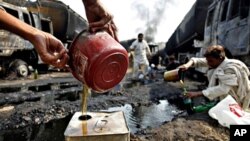The United States has apologized to Pakistan for last week's helicopter raid that killed Pakistani soldiers near the Afghan border. Despite the apology, the key border crossing for NATO's overland supply lines border remains closed and Taliban militants have destroyed more than 100 trucks in the past week. Thousands of other trucks now sit idle, waiting for the main crossing to reopen.
Gunmen stormed a truck depot on Nowshera district late Wednesday, burning some 26 vehicles. Earlier, another group of vehicles was attacked near the southern city Quetta. NATO supply routes have long been targeted by Pakistani militants, but the cluster of attacks following the Torkham border closure has highlighted the vulnerability of the route.
Truck drivers at the Torkham crossing on Wednesday said they had been left stranded by the closure, with many forced to stay with their NATO supply containers to try to protect them from theft or attack. Driver Haider Khan Afradi said drivers are now at risk throughout their journey.
Watch Ravi Khanna's Companion TV Report:
"We are always in danger when we start from Karachi towards Torkham up to Kabul. There is no security for us and we are suffering a lot," Khan told the Associated Press.
NATO pays Pakistani contractors to unload fuel and supplies from cargo ships and fuel tankers arriving in the southern port Karachi. Truckers then drive the supplies hundreds of kilometers across the Hindu Kush mountains to landlocked Afghanistan. Parts of the routes pass through areas controlled by the Taliban and Pakistani officials have said in recent days that the government is not responsible for ensuring the trucks safety.
Pakistani officials also have not indicated when the border will reopen. Pakistan's Foreign Ministry Spokesman Abdul Basit said Thursday that officials are still evaluating the security situation and will reopen the supply route "in due course."
NATO authorities insist that the closure of their main land supply route is not hindering the Afghan war effort. But analysts say the extended closure is affecting the already tense relationship between Pakistan and the United States.
Harsh Pant, an analyst and lecturer at the Department of Defence Studies at King's College in London, predicts the border closure incident will lead to worsening relations between the two nations.
"I think they are very tense and perhaps at one of their lowest ebbs that we have seen in recent times. And the problem, of course, is on both sides," Pant said. "There is a sense about the impending end game in Afghanistan and what the other side is planning to do."
The United States has pressed Pakistan to more aggressively go after militant safe havens on the Pakistani side of the border. While Pakistani forces have launched assaults in parts of the border region and elsewhere in the northwest, the army has not attacked the main militant strongholds in the North Waziristan tribal region. Instead, the United States is increasingly targeting fighters there with drone attacks, pounding the region last month with a record number of strikes against suspected militant hideouts.
Pakistan officially opposes the drone policy, and the foreign ministry spokesman Thursday said authorities continue to raise the issue with Washington.
"About drone attacks, I have very clearly articulated and cited our position," Basit said. "We do have strong differences with the U.S. on these attacks as well, and there are ongoing consultations with the U.S. on this issue, and we hope that the U.S. would reflect on this, would re-visit its position."
Despite the denials, Pakistani authorities are believed to privately condone the practice and secretly work with the United States intelligence agency, the CIA, to help target Islamic extremists.
The United States has provided more than $15 billion in aid to Pakistan since the September 11, 2001 terrorist attacks, and in return, Pakistan has allowed coalition forces to use the country as a key transit route for supplies.
Publicly, top U.S. and Pakistani officials say the key relationship between the U.S. and Pakistani remains productive. But throughout the war, there has also been evidence that the two countries have fundamental differences over their goals in Afghanistan.
The Wall Street Journal newspaper reported on Thursday that members of Pakistan's intelligence agency are pressuring militants to continue fighting against NATO and the United States, despite Afghan efforts to begin peace talks. Pakistani authorities denied the allegation, made by an anonymous Taliban commander quoted by the newspaper. An unnamed Pakistan official told The Wall Street Journal that the Pakistani spy agency is an easy scapegoat for failures in Afghanistan.




